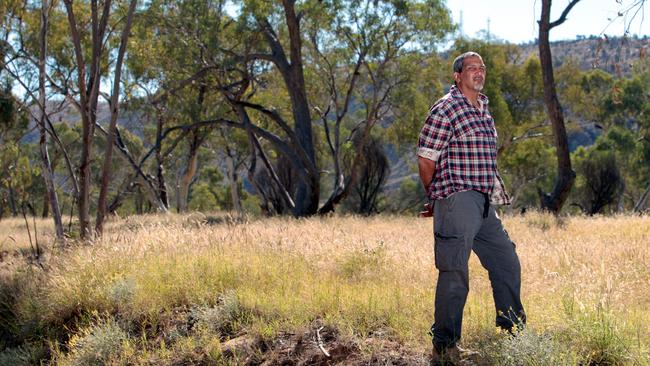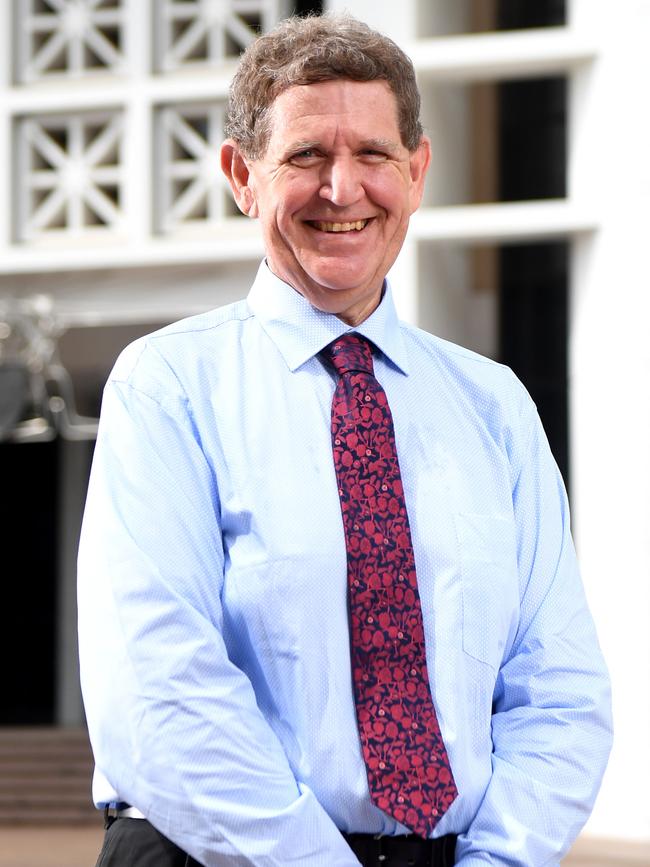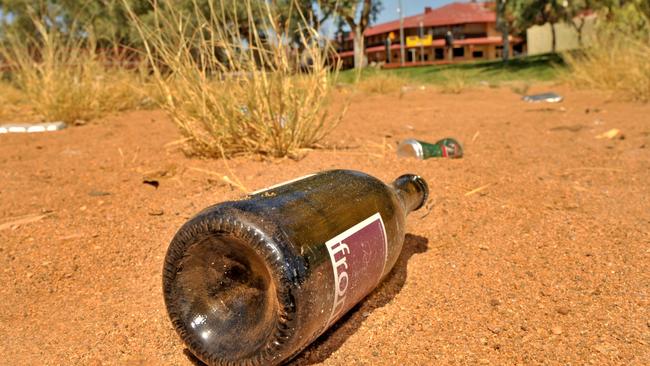Stimulus payments can’t just flow into communities plagued with social issues
It doesn’t actually help anyone to have money just flow into communities where there are already serious social issues, writes MATT CUNNINGHAM
Opinion
Don't miss out on the headlines from Opinion. Followed categories will be added to My News.
MICHAEL Liddle’s shirt bears the motto of Codes 4 Life, the program he runs for Aboriginal men at the Alice Springs Desert Knowledge Centre.
“Telling it straight,” it says, and it’s a mantra he could never be accused of ignoring.
During an interview last week about the impact of extra coronavirus stimulus payments and early access to superannuation, Liddle delivered a brutal articulation of the carnage that’s been caused after the Federal Government poured thousands of extra dollars into bank accounts with little thought about what are now being described as the “unintended consequences”.
“We have to be much more educated on why the COVID-19 money was given, it wasn’t because you’re a good bloke and you deserve a payrise through your Centrelink, it was to sustain your life so you could manage your food, your electricity and all these other utilities because of your lack of opportunity to find employment,” he said.

“Aboriginal people just saw it as a top up in their wage they don’t really know where it’s come from but I’m gonna spend it, and I’m spending it on alcohol.
“A lot more education’s needed around the purpose of that money, but also you gotta remember that the disadvantage of people, any form of increased money is an opportunity to improve what their wants and needs are and it just sad that our wants and needs are alcohol.
“That could be put down to a lot of things, it could be intergenerational disadvantage stemming back from years ago, it could be poor education it could be health, employment opportunities all that sort of stuff.
“There’s a huge Aboriginal problem and a lack of education has contributed to this.”
A Sky News/NT News investigation this week detailed the devastating social impacts the covid stimulus payments have had on Indigenous communities.
It would be wrong to say the investigation revealed anything — documents obtained under Freedom of Information simply confirmed what people on the ground in these communities had been saying quietly for more than six months.
The documents — briefs sent to Minister for Indigenous Australians Ken Wyatt — show the extra money has been linked to increases in alcohol and drug consumption, gambling and a host of other issues.
And while these consequences have been described as “unintended”, no-one could argue they were unforeseen.
Last March, Labor-turned-independent MLA Scott McConnell called for the extra payments to be suspended amid fears they could lead to alcohol abuse and increase the risk of coronavirus transmission.
“Although a lot of people will do the right thing with the payments and spend them on food or clothing or other things, we do need to acknowledge that in the Northern Territory we do have an issue with these types of stimulus payments being turned into alcohol and other damaging drugs,” he said.
MORE MATT CUNNINGHAM OPINIONS
Labor and CLP need to end sexist decisions and slurs
We can’t delay public service cuts any longer if we want to get out of this economic crisis
Social media ‘news’ is being delivered to you at the expense of scrutiny and truth
“I am very concerned that a number of people could be interested in coming to urban centres to engage in activities that are not good for their health or welfare and then being stuck in town and exposed to greater risk at this time of the coronavirus.”
How sadly prophetic those words have proven to be.
But did anyone listen to McConnell? No. Instead, he was taken to task by the urban-dwelling outrage mob and even branded a racist. This is an absurd accusation considering the man in question grew up at Napperby Station and has spent the best part of his adult life campaigning to improve the lives of Aboriginal people. Yet an army of Twitter warriors who rarely leave the comfy confines of their inner-city coffee shops would have you believe McConnell was about to sign up with One Nation, simply for sounding a warning about what many in the Territory knew was inevitable.

The documents show the Federal Government was warned as soon as the money started flowing about increases in alcohol and drug consumption and gambling.
As the biosecurity zones were lifted there was an influx of people coming in to Darwin, Katherine, Tennant Creek and Alice Springs. Since then there have been massive increases in alcohol-related assaults and domestic violence. In Alice Springs, dozens of children, some as young as eight, wander the streets unsupervised well after midnight. Remote classrooms have emptied and urban hospitals are full.
In the past four months, two women have been killed in horrific domestic violence incidents. It might be a bridge too far to link these deaths directly to the extra money, but there’s a strong body of evidence that shows dumping large sums of cash in bank accounts can have devastating side effects.
During her 2017 sentencing of a man who killed his former partner during a drunken assault at the Nightcliff foreshore, Justice Jenny Blokland questioned why mining royalties were handed out unconditionally to people in remote communities.
“It seems a tragedy that royalty payments were used for a binge drinking session in Darwin,” she said of the incident that claimed the life of an innocent woman.

Some Aboriginal corporations have shown strong leadership when it comes to these payments, ensuring they are placed into trusts that benefit the entire community, not just a chosen few. In Northeast Arnhem Land the Gumatj Corporation invests royalties into business enterprises including a timber mill, butchery and even its own mine, delivering hundreds of jobs to local Yolngu. And on Groote Eylandt — despite some issues in the past with the Groote Eylandt Aboriginal Trust — the Anindilyakwa Land Council is working on similar ventures, investing royalties into businesses as well as social and cultural programs.
Yet the lessons learned by some Aboriginal leaders were ignored by the Federal Government as it poured thousands of dollars into bank accounts with little concern about the predictable — if unintended — consequences.
It’s now been left to the NT Government — in particular its police force and paramedics — to deal with those consequences as they play out on the streets of Darwin, Katherine, Tennant Creek and Alice Springs.
The information in the documents sent to the Minister for Indigenous Australians is backed up by police and education department statistics and the anecdotal stories of just about everyone we spoke to on the ground.
Yet debates in this country — particularly ones around Indigenous Affairs — have a tendency to be dominated by people who will do everything in their power to convince you the sky is down, when there’s an overwhelming body of evidence that tells you it’s up.
Before we published a single story we were contacted by the head of a non-government organisation trying to make sure we got the narrative right.
Sadly, the facts in this case speak for themselves.
But the bigger problem here is not the impact of the COVID money. It’s the circumstances that existed before that money arrived.
The despairing existing of so many people in remote communities where welfare dependency has become a way of life and economic development looks increasingly like a pipe dream. A crisis that’s been created and then ignored by successive governments at every level.
It might be time to take a leaf out of Michael Liddle’s book and start telling it like it is, for we’ll never fix a problem by pretending it doesn’t exist.


